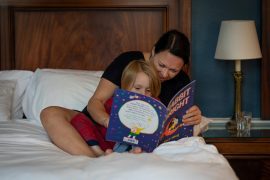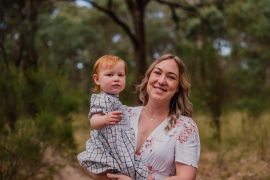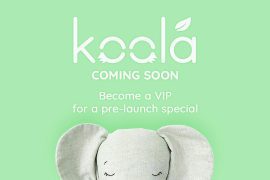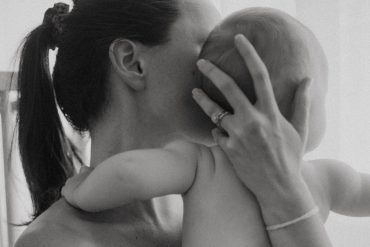Myth #4. Motions naps do not count as real naps.
This is another common but inaccurate myth. According to sleep scientists, the primary purpose of naps is to relieve sleep pressure, which is the biological mechanism that drives us to sleep[3]. Sleep pressure increases the longer your baby has been awake[3]. This means that any time a baby naps, no matter the length of the nap or where it takes place (i.e. stroller, carrier, car seat, etc.), the nap has been “successful” in the sense that it has relieved some of the sleep pressure. So, there is no reason to feel guilty if your baby naps better on the go or in the carrier. In fact, there are many benefits for your mental health if you can be on the go for at least one of your baby’s naps so you aren’t stuck in the house all day!
Just remember you are doing an amazing job responding to your baby’s needs day and night.
Myth #5. Baby sleep progresses in a linear fashion
This myth implies that once baby starts sleeping longer stretches at night, that it is not typical for them to start waking more frequently again. However, it has been shown that it is common for infants between 6-12 months who were sleeping longer stretches to start waking more frequently at night [4]. Another study that examined infants between 3 to 42 months found that “sleep duration and number of night waking episodes were unstable” for these children during this time period[5]. Therefore, these increased wakings are more than likely due to factors beyond your control such as teething, increased separation anxiety, reaching developmental milestones, and growth spurts among others. The takeaway from this is to not stress if your baby is suddenly waking more frequently as it is developmentally normal and by supporting them through these various challenges, you are continuing to help them develop a healthy relationship with sleep.
I hope this helped reduce your stress around your baby’s sleep! Just remember you are doing an amazing job responding to your baby’s needs day and night.
Sources:
[1] Anders T. F. (1994). Infant sleep, nighttime relationships, and attachment. Psychiatry, 57(1), 11-21. https://doi.org/10.1080/00332747.1994.11024664 [2] McKenna, J. (2019, July 25). “Is your baby sleeping through the night?” Thrive Global. https://thriveglobal.com/stories/is-your-baby-sleeping-through-the-night/ [3] Heffernan, L. (2020). [Lecture notes on understanding sleep]. Baby-Led Sleep Certification. https://islagrace.ca/independent-study-sleep-coach-certification/ [4] Scher A. (1991). A longitudinal study of night waking in the first year. Child: care, health and development, 17(5), 295-302. https://doi.org/10.1111/j.1365-2214.1991.tb00699.x [5] Scher, A., Epstein, R., & Tirosh, E. (2004). Stability and changes in sleep regulation: A longitudinal study from 3 months to 3 years. International Journal of Behavioral Development, 28(3), 268-274. https://doi.org/10.1080/01650250344000505Aileen is the founder of Connected Slumber Baby/Toddler Sleep Support and is a Certified Baby-Led Sleep and Well-Being Specialist. She takes a holistic approach to sleep meaning she is experienced in identifying underlying factors that could be impacting your child’s sleep as well as helping you make changes in a gentle and responsive manner, always keeping the attachment relationship at the forefront. Furthermore, she is very passionate about helping you understand biologically normal infant sleep and reducing the stress you may feel around sleep so you can focus on being the best parent you can be. To find out more about how she can help support you, follow her on Instagram @connectedslumber and check out her website www.connectedslumber.com.










